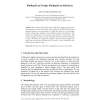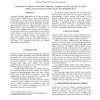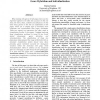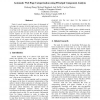LADS
2007
Springer
14 years 5 months ago
2007
Springer
One of the main reasons about the success of the Web is that many “regular users” are able to create Web pages that, using hyperlinks, incrementally extend both the size and th...
FC
2007
Springer
14 years 5 months ago
2007
Springer
This paper reports the highlights of a user study which gauges reactions to a variety of common “trust indicators” – such as logos, third party endorsements, and padlock icon...
ERCIMDL
2007
Springer
14 years 5 months ago
2007
Springer
We consider search engines and collaborative tagging systems from the perspective of resource discovery and re-finding on the Web. We performed repeated searches over nine-months o...
AWIC
2007
Springer
14 years 5 months ago
2007
Springer
In this paper, we propose an automatic summarization system to ease web browsing for visually impaired people on handheld devices. In particular, we propose a new architecture for ...
ADBIS
2007
Springer
14 years 5 months ago
2007
Springer
The paper presents an approach to combine knowledge from memory and brain sciences with information retrieval research in the design of Web agents. An information retrieval agent f...
ICMCS
2007
IEEE
14 years 5 months ago
2007
IEEE
Automatic web page segmentation is the basis to adaptive web browsing on mobile devices. It breaks a large page into smaller blocks, in which contents with coherent semantics are ...
ICDE
2007
IEEE
14 years 5 months ago
2007
IEEE
In this paper, we propose a novel method for generating personalized page links. The page links which are generated by our proposed method are useful if users look for web pages r...
IAT
2007
IEEE
14 years 5 months ago
2007
IEEE
This paper describes an intelligent agent to facilitate bitext mining from the Web via automatic discovery of URL pairing patterns (or keys) for retrieving parallel web pages. The...
HICSS
2007
IEEE
14 years 5 months ago
2007
IEEE
When dealing with genres of web pages, there are two important aspects to be taken into account. On the one hand, the web is fluid, unstable and fast-paced. On the other hand, gen...
HICSS
2007
IEEE
14 years 5 months ago
2007
IEEE
Today’s search engines retrieve tens of thousands of web pages in response to fairly simple query articulations. These pages are retrieved on the basis of the query terms occurr...




